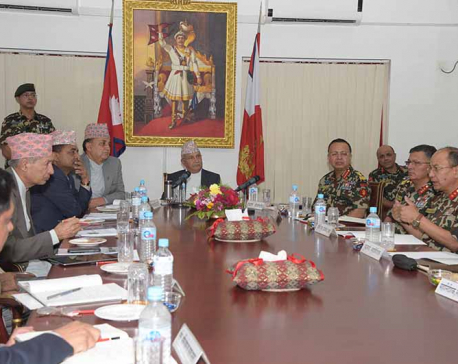
OR
Digital governance
The Ministry of Foreign Affairs seems to be at the forefront of digitizing governance in Nepal. At the start of January, it introduced a mobile app through which people will be able to apply for passports. Now it has launched an online application system that allows service seekers abroad to benefit from its various consular services from the comfort of their living rooms. Other organs of the government are also digitizing, some slowly, some rather fast. For instance the Public Service Commission these days accepts online applications for government jobs it advertises. The traffic police last year launched an app through which road accidents can be reported in real time; the app also makes it
possible to work out the areas with heavy traffic. (The traffic app has glitches, but we would like to believe it is a work in progress.) But despite recent progress in digitization of governance in Nepal, the public sector is still a laggard in this area as compared to the private sector that has embraced technology with far greater gusto.
As one civil servant from Saptari wrote in Republica recently, most computers and laptops in public offices are being used by their employees to view Facebook and Twitter—and for no other purpose. This is happening because even though the hardware (computers, laptops, smartphones) are now widely available in most of Nepal, the development of software has failed to catch up. For instance there is no shortage of software in English but the vast majority of our civil servants still struggle with the language. It would be far easier for them to use Nepali software. The technicians to train public staff on computer application are also in short supply, particularly outside Kathmandu valley. We also get to often read how fancy laptops have reached even the most remote schools, but then there are few people who can put them to good use or to teach computing to young
students. This is why there is a growing skepticism of digitization in Nepal. What good are computers that stay idle (or run only Facebook)? Isn’t the partial digitization of governance in Nepal adding more confusion than it is helping solve existing problems, particularly for the older generations not so versed in computer and smart-phone use?
Yes, there are problems. But there is also no alternative to embracing technology if Nepal is to keep up with the rapidly digitizing world. While public servants could do better than use their computers for Facebook, the desire to use the social networking site at least makes them more curious about the underlying technology, and in the process they also learn how to fire up their computers and browse the net. All those laptops lying idle in our villages could also be better used, but the curious young minds also get to see them and wonder about their limitless applications. But there is a definite case for the government to push for greater computer literacy and production of capable manpower in the field. It was in 2002 that the country first made a serious effort to embrace a digital future, when it established the National Information Technology Center (NITC) under the Ministry of Science and Technology. But progress since has been patchy. Despite its great promise IT is still not a state priority.
You May Like This

PM expresses concern over Kathmandu-Tarai-Madhes expressway progress
KATHMANDU, June 13: Prime Minister KP Sharma Oli has expressed his concern over the progress of Kathmandu-Tarai/ Madhes Expressway. ... Read More...

PAC seeks progress report on CGT recovery from Ncell
KATHMANDU, March 1: The Public Accounts Committee (PAC) has decided to ask the government to furnish it progress report on recovering... Read More...

Pilgrim’s progress
Muktiyatra by Binod Sadhak is a labor of love, and for anyone contemplating a tour of the holy places in... Read More...





Just In
- World Malaria Day: Foreign returnees more susceptible to the vector-borne disease
- MoEST seeks EC’s help in identifying teachers linked to political parties
- 70 community and national forests affected by fire in Parbat till Wednesday
- NEPSE loses 3.24 points, while daily turnover inclines to Rs 2.36 billion
- Pak Embassy awards scholarships to 180 Nepali students
- President Paudel approves mobilization of army personnel for by-elections security
- Bhajang and Ilam by-elections: 69 polling stations classified as ‘highly sensitive’
- Karnali CM Kandel secures vote of confidence














Leave A Comment